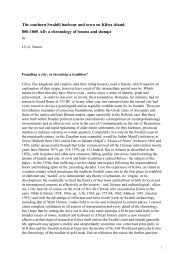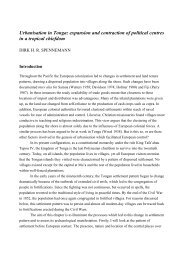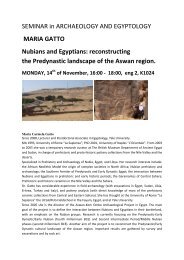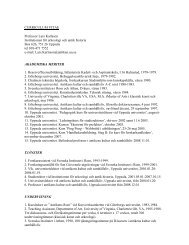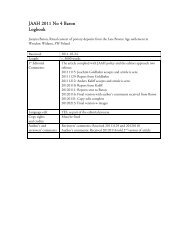Beowulf - Institutionen för arkeologi och antik historia
Beowulf - Institutionen för arkeologi och antik historia
Beowulf - Institutionen för arkeologi och antik historia
Create successful ePaper yourself
Turn your PDF publications into a flip-book with our unique Google optimized e-Paper software.
Figure 22. The structure of Wealhtheow’s speach and her use of the word good.<br />
Since good is a commonly used word with a meaning that is difficult to restrict one<br />
would expect there to be exceptions to its usage as a structuring word in this specific<br />
kind of narrative, but they are surprisingly few. In <strong>Beowulf</strong> the word is used twice<br />
(once v. 1952 and once in v. 1969), without belonging to the same episode. The<br />
tendency to use the word twice rather than once is at hand, but the thematic link is<br />
not acknowledged. In v. 236 of Maldon we find the word used once in the centre of<br />
the brave, encouraging, but short speech delivered by Offa, Byrhtnoth’s second-incommand.<br />
This means that only in three out of 29 cases is the word used with a nonstructural<br />
function.<br />
Although the structuring qualities of the word are perhaps more substantial than<br />
we would have expected, its prominence does not come as a surprise since both<br />
poems concern the problem of being good. Maldon is a tragic poem about<br />
Byrhtnoth’s lost battle and <strong>Beowulf</strong> (Part I) is the tale about the success of the<br />
victorious hero. Both men are, however, characterised as good. Their virtues are<br />
many, but such things as generosity, honour, friendship, righteousness, loyalty, eloquence<br />
and even physical strength are clearly linked to the two men’s quality of being<br />
good.<br />
The word plays an important role also in the Sabas letter. Sabas is obviously not<br />
characterised by the same sort of goodness as <strong>Beowulf</strong> and Byrhtnoth, since his<br />
goodness is internal and a matter of his peaceful, loving, pious and strong-hearted<br />
Christian disposition, but the tendency for the probably Germanic author to repeat<br />
the word at short intervals in the beginning, i.e., the second section, of his narrative<br />
when Sabas’ daily actions, rather than his general Christian opinions are in focus, is<br />
obvious enough. It is essential for the author to point out Sabas as being good and<br />
also partly good in his actions, before we hear of his persecution (Herschend 199,<br />
pp. 155 ff.).<br />
Although Venantius Fortunatus writes about a successful Germanic hero, in effect<br />
a good man rather than a tragic figure, and although there are many opportunities to<br />
64



